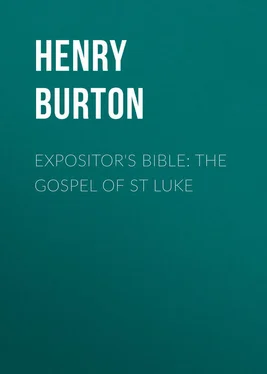Henry Burton - Expositor's Bible - The Gospel of St Luke
Здесь есть возможность читать онлайн «Henry Burton - Expositor's Bible - The Gospel of St Luke» — ознакомительный отрывок электронной книги совершенно бесплатно, а после прочтения отрывка купить полную версию. В некоторых случаях можно слушать аудио, скачать через торрент в формате fb2 и присутствует краткое содержание. Издательство: Иностранный паблик, Жанр: foreign_religion, foreign_antique, foreign_prose, на английском языке. Описание произведения, (предисловие) а так же отзывы посетителей доступны на портале библиотеки ЛибКат.
- Название:Expositor's Bible: The Gospel of St Luke
- Автор:
- Издательство:Иностранный паблик
- Жанр:
- Год:неизвестен
- ISBN:нет данных
- Рейтинг книги:3 / 5. Голосов: 1
-
Избранное:Добавить в избранное
- Отзывы:
-
Ваша оценка:
- 60
- 1
- 2
- 3
- 4
- 5
Expositor's Bible: The Gospel of St Luke: краткое содержание, описание и аннотация
Предлагаем к чтению аннотацию, описание, краткое содержание или предисловие (зависит от того, что написал сам автор книги «Expositor's Bible: The Gospel of St Luke»). Если вы не нашли необходимую информацию о книге — напишите в комментариях, мы постараемся отыскать её.
Expositor's Bible: The Gospel of St Luke — читать онлайн ознакомительный отрывок
Ниже представлен текст книги, разбитый по страницам. Система сохранения места последней прочитанной страницы, позволяет с удобством читать онлайн бесплатно книгу «Expositor's Bible: The Gospel of St Luke», без необходимости каждый раз заново искать на чём Вы остановились. Поставьте закладку, и сможете в любой момент перейти на страницу, на которой закончили чтение.
Интервал:
Закладка:
It is the autumn service for the course of Abia – which is the eighth of the twenty-four courses into which the priesthood was divided – and Zacharias proceeds to Jerusalem, to perform whatever part of the service the lot may assign to him. It is probably the evening of the Sabbath – the presence of the multitude would almost imply that – and this evening the lot gives to Zacharias the coveted distinction – which could only come once in a lifetime – of burning incense in the Holy Place. At a given signal, between the slaying and the offering of the lamb, Zacharias, barefooted and robed in white, passes up the steps, accompanied by two assistants, one bearing a golden censer containing half a pound of the sweet-smelling incense, the other bearing a golden vessel of burning coals taken from the altar. Slowly and reverently they pass within the Holy Place, which none but Levites are permitted to enter; and having arranged the incense, and spread the live coals upon the altar, the assistants retire, leaving Zacharias alone – alone in the dim light of the seven-branched candlestick, alone beside that veil he may not uplift, and which hides from his sight the Holy of Holies, where God dwells "in the thick darkness." Such is the place, and such the supreme moment, when Heaven breaks the silence of four hundred years.
It is no concern of ours to explain the phenomenon that followed, or to tone down its supernatural elements. Given an Incarnation, and then the supernatural becomes not only probable, but necessary. Indeed, we could not well conceive of any new revelation without it; and instead of its being a weakness, a blemish on the page of Scripture, it is rather a proof of its heavenliness, a hall-mark that stamps its Divinity. Nor is there any need, believing as we do in the existence of intelligences other and higher than ourselves, that we apologize for the appearance of angels, here and elsewhere, in the story; such deference to Sadducean doubts is not required.
Suddenly, as Zacharias stands with uplifted hands, joining in the prayers offered by the silent "multitude" without, an angel appears. He stands "on the right side of the altar of incense," half-veiled by the fragrant smoke, which curling upwards, filled the place. No wonder that the lone priest is filled with "fear," and that he is "troubled" – a word implying an outward tremor, as if the very body shook with the unwonted agitation of the soul. The angel does not at first announce his name, but seeks rather to calm the heart of the priest, stilling its tumult with a "Fear not," as Jesus stilled the waters with His "Peace." Then he makes known his message, speaking in language most homely and most human: "Thy prayer is heard." Perhaps a more exact rendering would be, "Thy request was granted," for the substantive implies a specific prayer, while the verb indicates a "hearing" that becomes an "assenting." What the prayer was we may gather from the angel's words; for the whole message, both in its promise and its prophecy, is but an amplification of its first clause. To the Jew, childlessness was the worst of all bereavements. It implied, at least they thought so, the Divine displeasure; while it effectually cut them off from any personal share in those cherished Messianic hopes. To the Hebrew heart the message, "Unto you a son is born," was the music of a lower Gospel. It marked an epoch in their life-history; it brought the fulfilment of their desires, and a wealth of added dignities. And Zacharias had prayed, earnestly and long, that a son might be born to them; but the bright hope, with the years, had grown distant and dim, until at last it had dropped down beyond the horizon of their thoughts, and become an impossibility. But those prayers were heard, yea, and granted, too, in the Divine purpose; and if the answer has been delayed, it was that it might come freighted with a larger blessing.
But in saying that this was the specific prayer of Zacharias we do not wish to disparage his motives, confining his thoughts and aspirations within a circle so narrow and selfish. This lesser hope of offspring, like a satellite, revolved around the larger hope of a Messiah, and indeed grew out of it. It drew all its brightness and all its beauty from that larger hope, the hope that lighted up the dark Hebrew sky with the auroras of a new and fadeless dawn. When mariners "take the sun," as they call it, reading from its disc their longitudes, they bring it down to their horizon-level. They get the higher in the lower vision, and the real direction of their looks is not the apparent direction. And if Zacharias' thoughts and prayers seem to have an earthward drift, his soul looks higher than his speech; and if he looks along the horizon-level of earthly hopes, it is that he may read the heavenly promise. It is not a son that he is looking for, but the Son, the "Seed" in whom "all the families of the earth shall be blessed." And so, when the silent tongue regains its powers of speech, it gives its first and highest doxologies for that other Child, who is Himself the promised "redemption" and a "horn of salvation;" his own child he sets back, far back in the shadow (or rather the light) of Him whom he calls the "Lord." It is the near realization of both these hopes that the angel now announces.
A son shall be born to them, even in their advanced years, and they shall call his name "John," which means "The Lord is gracious." "Many will rejoice with them at his birth," for that birth will be the awakening of new hopes, the first hour of a new day. "Great in the sight of the Lord," he must be a Nazarite, abstaining wholly from "wine and strong drink" – the two Greek words including all intoxicants, however made. "Filled with the Holy Ghost from his mother's womb" – that original bias or propensity to evil, if not obliterated, yet more than neutralized – he shall be the Elijah (in spirit and in power) of Malachi's prophecy, turning many of Israel's children "to the Lord their God." "Going before Him" – and the antecedent of "Him" must be "the Lord their God" of the preceding verse, so early is the purple of Divinity thrown around the Christ – he "shall turn the hearts of fathers to their children," restoring peace and order to domestic life, and the "disobedient" he shall incline "to walk in the wisdom of the just" (R.V.), bringing back the feet that have erred and slipped to "the paths of uprightness," which are the "ways of wisdom." In short, he shall be the herald, making ready a people prepared for the Lord, running before the royal chariot, proclaiming the coming One, and preparing His way, then leaving his own little footprints to disappear, thrown up in the chariot-dust of Him who was greater and mightier than he.
We can easily understand, even if we may not apologize for, the incredulity of Zacharias. There are crises in our life when, under profound emotion, Reason herself seems bewildered, and Faith loses her steadiness of vision. The storm of feeling throws the reflective powers into confusion, and thought becomes blurred and indistinct, and speech incoherent and wild. And such a crisis was it now, but intensified to the mind of Zacharias by all these additions of the supernatural. The vision, with its accessories of place and time, the message, so startling, even though so welcome, must necessarily produce a strange pertubation of soul; and what surprise need there be that when the priest does speak it is in the lisping accents of unbelief? Could it well have been otherwise? Peter "wist not that it was true which was done by the angel, but thought he saw a vision;" and though Zacharias has none of these doubts of unreality – it is to him no dream of the moment's ecstasy – still he is not yet aware of the rank and dignity of his angel-visitant, while he is perplexed at the message, which so directly contravenes both reason and experience. He does not doubt the Divine power, let it be observed, but he does seek for a sign that the angel speaks with Divine authority. "Whereby shall I know this?" he asks, reminding us by his question of Jacob's "Tell me thy name." The angel replies, in substance, "You ask whereby you may know this; that is, you wish to know by whose authority I declare this message to you. Well, I am Gabriel, that stand in the presence of God; and I was sent to speak unto you, and to bring you these good tidings. And since you ask for a sign, an endorsement of my message, you shall have one. I put the seal of silence upon your lips, and you shall not be able to speak until the day when these things shall come to pass, because you believed not my words." Then the vision ends; Gabriel returns to the songs and anthems of the skies, leaving Zacharias to carry, in awful stillness of soul, this new "secret of the Lord."
Читать дальшеИнтервал:
Закладка:
Похожие книги на «Expositor's Bible: The Gospel of St Luke»
Представляем Вашему вниманию похожие книги на «Expositor's Bible: The Gospel of St Luke» списком для выбора. Мы отобрали схожую по названию и смыслу литературу в надежде предоставить читателям больше вариантов отыскать новые, интересные, ещё непрочитанные произведения.
Обсуждение, отзывы о книге «Expositor's Bible: The Gospel of St Luke» и просто собственные мнения читателей. Оставьте ваши комментарии, напишите, что Вы думаете о произведении, его смысле или главных героях. Укажите что конкретно понравилось, а что нет, и почему Вы так считаете.












